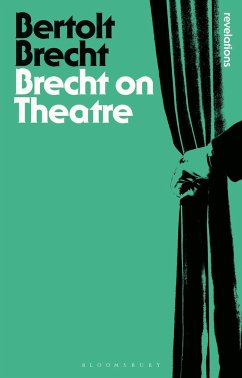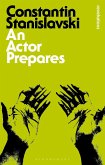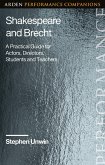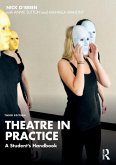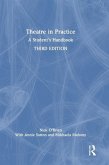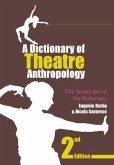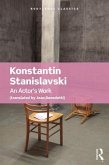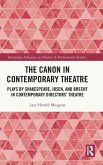- Broschiertes Buch
- Merkliste
- Auf die Merkliste
- Bewerten Bewerten
- Teilen
- Produkt teilen
- Produkterinnerung
- Produkterinnerung
"First published by Methuen Drama in 1964 in an edition translated and with notes by John Willett. Copyright John Willett, 1964. The translation and selection of material in this edition first published in Great Britain by Bloomsbury Methuen Drama, 2015."
Andere Kunden interessierten sich auch für
![An Actor Prepares An Actor Prepares]() Constantin StanislavskiAn Actor Prepares26,99 €
Constantin StanislavskiAn Actor Prepares26,99 €![Shakespeare and Brecht Shakespeare and Brecht]() Stephen Unwin (Theatre Director Author)Shakespeare and Brecht14,99 €
Stephen Unwin (Theatre Director Author)Shakespeare and Brecht14,99 €![Theatre in Practice Theatre in Practice]() Nick O'BrienTheatre in Practice46,99 €
Nick O'BrienTheatre in Practice46,99 €![Theatre in Practice Theatre in Practice]() Nick O'BrienTheatre in Practice154,99 €
Nick O'BrienTheatre in Practice154,99 €![A Dictionary of Theatre Anthropology A Dictionary of Theatre Anthropology]() Eugenio BarbaA Dictionary of Theatre Anthropology87,99 €
Eugenio BarbaA Dictionary of Theatre Anthropology87,99 €![An Actor's Work An Actor's Work]() Konstantin StanislavskiAn Actor's Work25,99 €
Konstantin StanislavskiAn Actor's Work25,99 €![The Canon in Contemporary Theatre The Canon in Contemporary Theatre]() Lars Harald MaagerøThe Canon in Contemporary Theatre154,99 €
Lars Harald MaagerøThe Canon in Contemporary Theatre154,99 €-
-
-
"First published by Methuen Drama in 1964 in an edition translated and with notes by John Willett. Copyright John Willett, 1964. The translation and selection of material in this edition first published in Great Britain by Bloomsbury Methuen Drama, 2015."
Produktdetails
- Produktdetails
- Bloomsbury Revelations
- Verlag: Bloomsbury Academic
- Artikelnr. des Verlages: 403651
- Seitenzahl: 392
- Erscheinungstermin: 18. Oktober 2018
- Englisch
- Abmessung: 217mm x 139mm x 25mm
- Gewicht: 494g
- ISBN-13: 9781350068902
- ISBN-10: 135006890X
- Artikelnr.: 52635434
- Herstellerkennzeichnung
- Libri GmbH
- Europaallee 1
- 36244 Bad Hersfeld
- gpsr@libri.de
- Bloomsbury Revelations
- Verlag: Bloomsbury Academic
- Artikelnr. des Verlages: 403651
- Seitenzahl: 392
- Erscheinungstermin: 18. Oktober 2018
- Englisch
- Abmessung: 217mm x 139mm x 25mm
- Gewicht: 494g
- ISBN-13: 9781350068902
- ISBN-10: 135006890X
- Artikelnr.: 52635434
- Herstellerkennzeichnung
- Libri GmbH
- Europaallee 1
- 36244 Bad Hersfeld
- gpsr@libri.de
Bertolt Brecht (1898-1956) is acknowledged as one of the great dramatists whose plays, work with the Berliner Ensemble and critical writings have had a considerable influence on the theatre. His landmark plays include The Threepenny Opera, Fear and Misery of the Third Reich, The Life of Galileo, Mother Courage and Her Children and The Caucasian Chalk Circle.
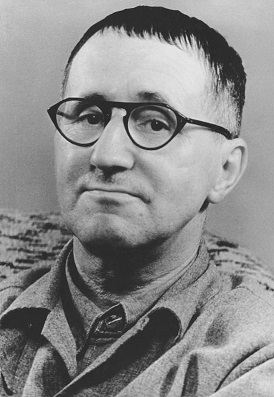
Bundesarchiv, Bild 183-W0409-300 / Kolbe, Jörg / CC-BY-SA
List of Illustrations
General Introduction and Acknowledgements
Part One - A New Theatre
Introduction to Part One
Frank Wedekind (1918)
Me in the Theatre (1920)
Theatre as Sport (1920)
A Reckoning (1920)
On the Aesthetics of Drama (1920)
On the 'Downfall of the Theatre' (1925)
More Good Sport (1926)
Three Cheers for Shaw (1926)
Prologue to Drums (1926)
Shouldn't We Liquidate Aesthetics? (1927)
Epic Theatre and Its Difficulties (1927)
On New Dramatic Writing (1928)
Latest Stage: Oedipus (1929)
Dialogue about Acting (1929)
On Subject-Matter and Form (1929)
On Rehearsing (c. 1930)
Dialectical Dramatic Writing (1930/31)
Notes on the Opera Rise and Fall of the City of Mahagonny (1930)
Notes on the Threepenny Opera (1931)
Notes on the Comedy Man Equals Man (1931/38)
Notes on The Mother (1933/38)
Part Two - Exile Years
Introduction to Part Two
OLD VS. NEW THEATRE
Theatre for Pleasure or Theatre for Instruction (1935)
On Experiments in Epic Theatre (1935)
The German Drama: pre-Hitler (1935)
On the Use of Music in an Epic Theatre (1935)
Short List of the Most Frequent, Common and Boring Misconceptions about Epic Theatre (1937)
The Progressiveness of the Stanislavsky System (1937)
On Experimental Theatre (1939)
A Short Private Lecture for My Friend Max Gorelik (1944)
ON CHINESE THEATRE, VERFREMDUNG AND GESTUS
On the Art of Spectatorship (1935)
Maintaining Gestures over Multiple Generations (1935)
Verfremdung Effects in Chinese Acting (1936)
Three Notes on Verfremdung and the Elder Breughel (1937)
Verfremdung Techniques in the Narrative Pictures of the Elder Brueghel
On the V-effect of the Elder Breughel
V-effects in Some Pictures of the Elder Breughel
On Determining the Zero Point (1936/37)
The Zero Point (1936/37)
Notes on Pointed Heads and Round Heads (1936)
On the Production of the V-effect (1938)
On Gestic Music (1937)
On Rhymeless Verse with Irregular Rhythms (1938)
The Street Scene (1938)
Short Description of a New Technique of Acting that Produces a Verfremdung Effect (1940)
Athletic Training (1940)
On Epic Dramatic Art: Change (1940)
On the Gradual Approach to the Study and Construction of the Figure (1941)
REALISM AND THE PROLETARIAT
The Popular and the Realistic (1938)
Two Essay Fragments on Non-professional (1939)
The Attitude of the Rehearsal Director (in the Inductive Process) (1939)
Notes on the Folk Play (1940)
Part Three - Return to Germany
Introduction to Part Three
SHORT ORGANON
Short Organon for the Theatre (1948)
Appendices to the Short Organon (1954)
THEATRE WORK
Friedrich Wolf - Bert Brecht: Formal Problems Arising from the Theatre's New Content.
A Dialogue (1949)
From a Letter to an Actor (1951)
What Makes an Actor (1951)
Gesture (1951)
Two Notes about Urfaust (1952)
About Our Stagings
The Story
Kurt Palm (1952)
Classical Status as an Intimidating Factor (1954)
ON STANISLAVSKY
Some of the Things That Can Be Learnt from Stanislavsky (1951)
On Stanislavsky (1953)
Stanislavsky Studies [3] (1953)
A Few Thoughts on the Stanislavsky Conference (1953)
DIALECTICAL THEATRE
From Epic to Dialectical Theatre 2 (1954)
Dialectics in the Theatre
Study of the First Scene of Shakespeare's 'Coriolanus' (1953/55)
Relative Haste (1955)
A Detour (The Caucasian Chalk Circle) (1955)
Another Case of Applied Dialectic (1953)
Letter to the Actor Playing Young Hörder in Winter Battle (1954)
Mother Courage Played in Two Ways (1951)
Example of a Scenic Innovation Through the Observation of a Mistake (1953)
Something about Representing Character (1953)
Conversation about Coerced Empathy (1953)
MISCELLANEOUS
Cultural Policy and Academy of Arts (1953)
Socialist Realism in the Theatre (1954)
Can the Present-day World Be Reproduced by Means
General Introduction and Acknowledgements
Part One - A New Theatre
Introduction to Part One
Frank Wedekind (1918)
Me in the Theatre (1920)
Theatre as Sport (1920)
A Reckoning (1920)
On the Aesthetics of Drama (1920)
On the 'Downfall of the Theatre' (1925)
More Good Sport (1926)
Three Cheers for Shaw (1926)
Prologue to Drums (1926)
Shouldn't We Liquidate Aesthetics? (1927)
Epic Theatre and Its Difficulties (1927)
On New Dramatic Writing (1928)
Latest Stage: Oedipus (1929)
Dialogue about Acting (1929)
On Subject-Matter and Form (1929)
On Rehearsing (c. 1930)
Dialectical Dramatic Writing (1930/31)
Notes on the Opera Rise and Fall of the City of Mahagonny (1930)
Notes on the Threepenny Opera (1931)
Notes on the Comedy Man Equals Man (1931/38)
Notes on The Mother (1933/38)
Part Two - Exile Years
Introduction to Part Two
OLD VS. NEW THEATRE
Theatre for Pleasure or Theatre for Instruction (1935)
On Experiments in Epic Theatre (1935)
The German Drama: pre-Hitler (1935)
On the Use of Music in an Epic Theatre (1935)
Short List of the Most Frequent, Common and Boring Misconceptions about Epic Theatre (1937)
The Progressiveness of the Stanislavsky System (1937)
On Experimental Theatre (1939)
A Short Private Lecture for My Friend Max Gorelik (1944)
ON CHINESE THEATRE, VERFREMDUNG AND GESTUS
On the Art of Spectatorship (1935)
Maintaining Gestures over Multiple Generations (1935)
Verfremdung Effects in Chinese Acting (1936)
Three Notes on Verfremdung and the Elder Breughel (1937)
Verfremdung Techniques in the Narrative Pictures of the Elder Brueghel
On the V-effect of the Elder Breughel
V-effects in Some Pictures of the Elder Breughel
On Determining the Zero Point (1936/37)
The Zero Point (1936/37)
Notes on Pointed Heads and Round Heads (1936)
On the Production of the V-effect (1938)
On Gestic Music (1937)
On Rhymeless Verse with Irregular Rhythms (1938)
The Street Scene (1938)
Short Description of a New Technique of Acting that Produces a Verfremdung Effect (1940)
Athletic Training (1940)
On Epic Dramatic Art: Change (1940)
On the Gradual Approach to the Study and Construction of the Figure (1941)
REALISM AND THE PROLETARIAT
The Popular and the Realistic (1938)
Two Essay Fragments on Non-professional (1939)
The Attitude of the Rehearsal Director (in the Inductive Process) (1939)
Notes on the Folk Play (1940)
Part Three - Return to Germany
Introduction to Part Three
SHORT ORGANON
Short Organon for the Theatre (1948)
Appendices to the Short Organon (1954)
THEATRE WORK
Friedrich Wolf - Bert Brecht: Formal Problems Arising from the Theatre's New Content.
A Dialogue (1949)
From a Letter to an Actor (1951)
What Makes an Actor (1951)
Gesture (1951)
Two Notes about Urfaust (1952)
About Our Stagings
The Story
Kurt Palm (1952)
Classical Status as an Intimidating Factor (1954)
ON STANISLAVSKY
Some of the Things That Can Be Learnt from Stanislavsky (1951)
On Stanislavsky (1953)
Stanislavsky Studies [3] (1953)
A Few Thoughts on the Stanislavsky Conference (1953)
DIALECTICAL THEATRE
From Epic to Dialectical Theatre 2 (1954)
Dialectics in the Theatre
Study of the First Scene of Shakespeare's 'Coriolanus' (1953/55)
Relative Haste (1955)
A Detour (The Caucasian Chalk Circle) (1955)
Another Case of Applied Dialectic (1953)
Letter to the Actor Playing Young Hörder in Winter Battle (1954)
Mother Courage Played in Two Ways (1951)
Example of a Scenic Innovation Through the Observation of a Mistake (1953)
Something about Representing Character (1953)
Conversation about Coerced Empathy (1953)
MISCELLANEOUS
Cultural Policy and Academy of Arts (1953)
Socialist Realism in the Theatre (1954)
Can the Present-day World Be Reproduced by Means
List of Illustrations
General Introduction and Acknowledgements
Part One - A New Theatre
Introduction to Part One
Frank Wedekind (1918)
Me in the Theatre (1920)
Theatre as Sport (1920)
A Reckoning (1920)
On the Aesthetics of Drama (1920)
On the 'Downfall of the Theatre' (1925)
More Good Sport (1926)
Three Cheers for Shaw (1926)
Prologue to Drums (1926)
Shouldn't We Liquidate Aesthetics? (1927)
Epic Theatre and Its Difficulties (1927)
On New Dramatic Writing (1928)
Latest Stage: Oedipus (1929)
Dialogue about Acting (1929)
On Subject-Matter and Form (1929)
On Rehearsing (c. 1930)
Dialectical Dramatic Writing (1930/31)
Notes on the Opera Rise and Fall of the City of Mahagonny (1930)
Notes on the Threepenny Opera (1931)
Notes on the Comedy Man Equals Man (1931/38)
Notes on The Mother (1933/38)
Part Two - Exile Years
Introduction to Part Two
OLD VS. NEW THEATRE
Theatre for Pleasure or Theatre for Instruction (1935)
On Experiments in Epic Theatre (1935)
The German Drama: pre-Hitler (1935)
On the Use of Music in an Epic Theatre (1935)
Short List of the Most Frequent, Common and Boring Misconceptions about Epic Theatre (1937)
The Progressiveness of the Stanislavsky System (1937)
On Experimental Theatre (1939)
A Short Private Lecture for My Friend Max Gorelik (1944)
ON CHINESE THEATRE, VERFREMDUNG AND GESTUS
On the Art of Spectatorship (1935)
Maintaining Gestures over Multiple Generations (1935)
Verfremdung Effects in Chinese Acting (1936)
Three Notes on Verfremdung and the Elder Breughel (1937)
Verfremdung Techniques in the Narrative Pictures of the Elder Brueghel
On the V-effect of the Elder Breughel
V-effects in Some Pictures of the Elder Breughel
On Determining the Zero Point (1936/37)
The Zero Point (1936/37)
Notes on Pointed Heads and Round Heads (1936)
On the Production of the V-effect (1938)
On Gestic Music (1937)
On Rhymeless Verse with Irregular Rhythms (1938)
The Street Scene (1938)
Short Description of a New Technique of Acting that Produces a Verfremdung Effect (1940)
Athletic Training (1940)
On Epic Dramatic Art: Change (1940)
On the Gradual Approach to the Study and Construction of the Figure (1941)
REALISM AND THE PROLETARIAT
The Popular and the Realistic (1938)
Two Essay Fragments on Non-professional (1939)
The Attitude of the Rehearsal Director (in the Inductive Process) (1939)
Notes on the Folk Play (1940)
Part Three - Return to Germany
Introduction to Part Three
SHORT ORGANON
Short Organon for the Theatre (1948)
Appendices to the Short Organon (1954)
THEATRE WORK
Friedrich Wolf - Bert Brecht: Formal Problems Arising from the Theatre's New Content.
A Dialogue (1949)
From a Letter to an Actor (1951)
What Makes an Actor (1951)
Gesture (1951)
Two Notes about Urfaust (1952)
About Our Stagings
The Story
Kurt Palm (1952)
Classical Status as an Intimidating Factor (1954)
ON STANISLAVSKY
Some of the Things That Can Be Learnt from Stanislavsky (1951)
On Stanislavsky (1953)
Stanislavsky Studies [3] (1953)
A Few Thoughts on the Stanislavsky Conference (1953)
DIALECTICAL THEATRE
From Epic to Dialectical Theatre 2 (1954)
Dialectics in the Theatre
Study of the First Scene of Shakespeare's 'Coriolanus' (1953/55)
Relative Haste (1955)
A Detour (The Caucasian Chalk Circle) (1955)
Another Case of Applied Dialectic (1953)
Letter to the Actor Playing Young Hörder in Winter Battle (1954)
Mother Courage Played in Two Ways (1951)
Example of a Scenic Innovation Through the Observation of a Mistake (1953)
Something about Representing Character (1953)
Conversation about Coerced Empathy (1953)
MISCELLANEOUS
Cultural Policy and Academy of Arts (1953)
Socialist Realism in the Theatre (1954)
Can the Present-day World Be Reproduced by Means
General Introduction and Acknowledgements
Part One - A New Theatre
Introduction to Part One
Frank Wedekind (1918)
Me in the Theatre (1920)
Theatre as Sport (1920)
A Reckoning (1920)
On the Aesthetics of Drama (1920)
On the 'Downfall of the Theatre' (1925)
More Good Sport (1926)
Three Cheers for Shaw (1926)
Prologue to Drums (1926)
Shouldn't We Liquidate Aesthetics? (1927)
Epic Theatre and Its Difficulties (1927)
On New Dramatic Writing (1928)
Latest Stage: Oedipus (1929)
Dialogue about Acting (1929)
On Subject-Matter and Form (1929)
On Rehearsing (c. 1930)
Dialectical Dramatic Writing (1930/31)
Notes on the Opera Rise and Fall of the City of Mahagonny (1930)
Notes on the Threepenny Opera (1931)
Notes on the Comedy Man Equals Man (1931/38)
Notes on The Mother (1933/38)
Part Two - Exile Years
Introduction to Part Two
OLD VS. NEW THEATRE
Theatre for Pleasure or Theatre for Instruction (1935)
On Experiments in Epic Theatre (1935)
The German Drama: pre-Hitler (1935)
On the Use of Music in an Epic Theatre (1935)
Short List of the Most Frequent, Common and Boring Misconceptions about Epic Theatre (1937)
The Progressiveness of the Stanislavsky System (1937)
On Experimental Theatre (1939)
A Short Private Lecture for My Friend Max Gorelik (1944)
ON CHINESE THEATRE, VERFREMDUNG AND GESTUS
On the Art of Spectatorship (1935)
Maintaining Gestures over Multiple Generations (1935)
Verfremdung Effects in Chinese Acting (1936)
Three Notes on Verfremdung and the Elder Breughel (1937)
Verfremdung Techniques in the Narrative Pictures of the Elder Brueghel
On the V-effect of the Elder Breughel
V-effects in Some Pictures of the Elder Breughel
On Determining the Zero Point (1936/37)
The Zero Point (1936/37)
Notes on Pointed Heads and Round Heads (1936)
On the Production of the V-effect (1938)
On Gestic Music (1937)
On Rhymeless Verse with Irregular Rhythms (1938)
The Street Scene (1938)
Short Description of a New Technique of Acting that Produces a Verfremdung Effect (1940)
Athletic Training (1940)
On Epic Dramatic Art: Change (1940)
On the Gradual Approach to the Study and Construction of the Figure (1941)
REALISM AND THE PROLETARIAT
The Popular and the Realistic (1938)
Two Essay Fragments on Non-professional (1939)
The Attitude of the Rehearsal Director (in the Inductive Process) (1939)
Notes on the Folk Play (1940)
Part Three - Return to Germany
Introduction to Part Three
SHORT ORGANON
Short Organon for the Theatre (1948)
Appendices to the Short Organon (1954)
THEATRE WORK
Friedrich Wolf - Bert Brecht: Formal Problems Arising from the Theatre's New Content.
A Dialogue (1949)
From a Letter to an Actor (1951)
What Makes an Actor (1951)
Gesture (1951)
Two Notes about Urfaust (1952)
About Our Stagings
The Story
Kurt Palm (1952)
Classical Status as an Intimidating Factor (1954)
ON STANISLAVSKY
Some of the Things That Can Be Learnt from Stanislavsky (1951)
On Stanislavsky (1953)
Stanislavsky Studies [3] (1953)
A Few Thoughts on the Stanislavsky Conference (1953)
DIALECTICAL THEATRE
From Epic to Dialectical Theatre 2 (1954)
Dialectics in the Theatre
Study of the First Scene of Shakespeare's 'Coriolanus' (1953/55)
Relative Haste (1955)
A Detour (The Caucasian Chalk Circle) (1955)
Another Case of Applied Dialectic (1953)
Letter to the Actor Playing Young Hörder in Winter Battle (1954)
Mother Courage Played in Two Ways (1951)
Example of a Scenic Innovation Through the Observation of a Mistake (1953)
Something about Representing Character (1953)
Conversation about Coerced Empathy (1953)
MISCELLANEOUS
Cultural Policy and Academy of Arts (1953)
Socialist Realism in the Theatre (1954)
Can the Present-day World Be Reproduced by Means

